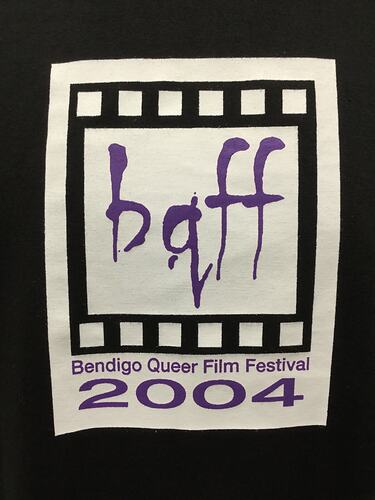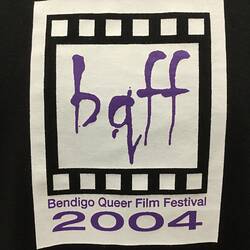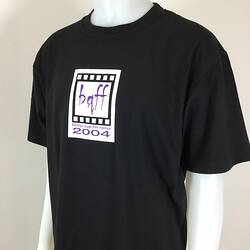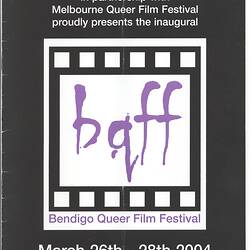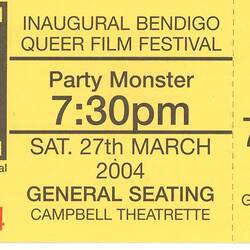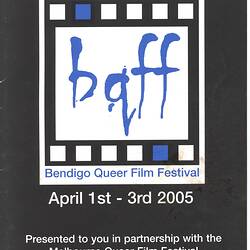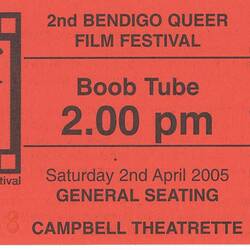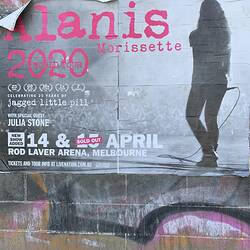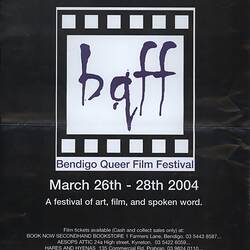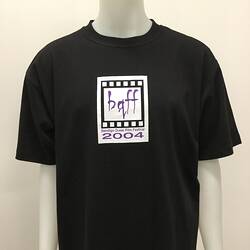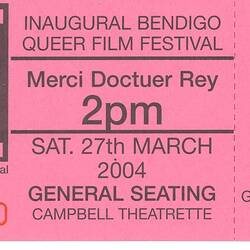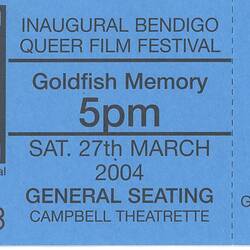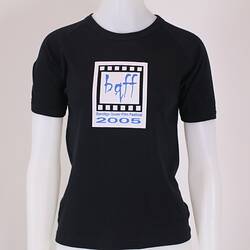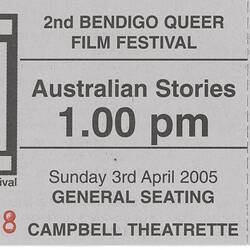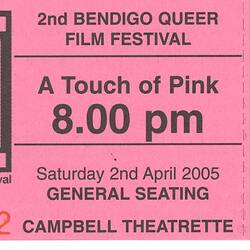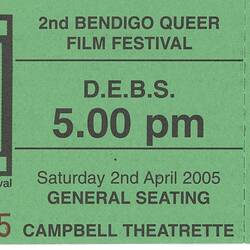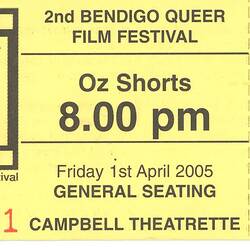'You never know the difference we're making to other people's lives' - Chris Walters
The Bendigo Queer Film Festival (BQFF) started in 2004 when Chris Walters, a new arrival to Central Victoria, realised there wasn't much for the local LGBTIQ+ community to do that wasn't linked to going to the nightclub scene.
She also was surprised at how many local LGBTIQ+ people were still in the closet. 'I noticed that there's so many professional women not out, like teachers, nurses, doctors. [I] go "This is crazy!", because they didn't feel safe enough [.] and at the time I thought, "[.] What can we do to start changing that perception?". At the time, regional life was still homophobic. She says, 'I thought to be hiding, [.] at the age of 50, or 60, or 70, I mean, or even in your 20s and 30s, because you don't think, you know, people are going to accept you. I wanted that to change'. She emphasised that, 'If you're not out, you're not seen, so you don't get the support and services you need'.
Chris loved movies - she says that they bring people together - and decided to start a Queer Film Festival. 'Going to Melbourne Queer Film Festival [.] seeing a few of those movies really had an impact on my life when I first was coming-out. I wanted that to be for other people'. But she knew she needed support from others.
Getting a Film Festival off the ground requires a lot of work. Her first move was to garner local support; she pulled together volunteers from Rainbow Connections, a coming out group for women. They had skills such as accounting, marketing, creative arts and lots of goodwill, all of which were required. Together, they formed the inaugural BQFF committee, expanding in the second year. Chris also got Friends Alike Bendigo (FAB), a gay and lesbian social support group, involved and also got the support of the Mayor of Bendigo, local MPs, and the local police Gay and Lesbian Liaison Officers (GLLOs).
Chris contacted Lisa Daniels, Director of the Melbourne Queer Film Festival (MQFF) since 1999, for advice, support and assistance. Lisa was sceptical Chris would follow through at first as many people before her had asked the same thing. Chris assured Lisa, 'I've got a lot of energy, [.] I'm determined to make it happen'. But ultimately Lisa offered Chris a range of feature and short films, extending the viewing rights for BQFF, and a wonderful partnership between the organisations was born.
The BQFF consisted of a 'long weekend' with an opening night film on Friday, and sessions of feature films, documentaries and short films on the Saturday and Sunday. There was an associated art exhibition called 'Gay Your Art Out', an after party on the Saturday night presented by FAB and a breakfast at a local café on the Sunday morning. Each Festival had a patron, the first one being Australian folk singer, lawyer and activist, Judy Small.
At the inaugural Festival in 2004 around 80 people attended. Among them was an 80-year-old man who lived an hour away on a farm. He had never been out as a gay man at a public venue before. Similarly, a lesbian couple drove over from Adelaide for the first five years. 'They said, "We can be us [at the Festival], but back in Adelaide we had to be just friends sharing a house"', remembers Chris.
That first Festival wasn't without its challenges though. First Chris needed funding. She managed to get an event grant of $1,000.00 from the local council, which was later matched by the State Government. Local businesses also sponsored the festival.
The projectionist (from the Bendigo Film Society) was the only paid role as they needed to show the 35mm film reels on a proper projector. The day before the first night, the projectionist, an older man, refused to run the films. Chris received a called from him and he declared, '"You are running blue movies!" And I said, "They're not blue movies!" [.] and he says, "I can't do it, and it's got no sound!"'. Chris called the President of the Bendigo Film Society who suggested that she use movies from the local video rental shop instead. But she already knew that she had people coming from interstate and around the local area. Lisa Daniels offered to come with video versions of the films but said that the film versions would be better in the theatre. In the end they managed to get the films to play, with sound.
Also in the second year, Chris put her home phone number on the media release for any questions from the press. The local paper decided to publish her phone number. 'I come home one night on the weekend and I just got some really terrible messages left on my answering machine'. But she wasn't deterred, 'I was thinking, "Oh good on you, you know, leave it on a message but don't give me your name and number for me to ring you back! [.] so brave of you!"'.
It was all a huge amount of work and Chris felt such a sense of relief at the breakfast after the first Festival. '[I was] just sitting back and going "Hey, we did it! We made it!" and I [was] thanking every single body that was involved [.] and we generated so much excitement that people wanted it to happen again the following year'.
Eventually Chris had to step back and other people took charge. She was honoured with a Lifetime Membership in 2015. 'I felt like I created something and when I got it through its toddler years, and I came back another time once in its teenage years [laughs], and now it's really well and truly an adult with its own identity. So good [to] see other people take it on and work on it. Really feel grateful and filled with pride about that'.
In 2019 Chris Butler became Convenor of the Festival. Until then the BQFF program had remained essentially the same since its foundation. However, early in his term he faced a massive challenge: the Covid-19 Pandemic. 'Absolutely everything got shut down, so we had the Film Festival on at the same time as the Bendigo Pride Festival was happening and all [of] it got shut down four days before we're about to start', he remembers. They lost 'all the money that we paid for films because by the time it got to the point where we could put a film festival on again our right to the films had expired'.
The following years were heavily restricted and Chris Butler went with a shortened program. A new international competition of short films that had been started by the BQFF in 2019 was effectively self-funding and proved popular. However, even after restrictions lifted and there was a return to a bigger program, it seemed that audiences had changed the way they viewed movies and had largely stopped going to the cinema: 'Basically, the audiences didn't come, I think that's partly that people weren't back into doing those sorts of things . it was a lot of money [to run the Festival] for very few people'.
In spite of these challenges, the BQFF continues to this day and will run again with its 20th program in 2024. It will have an opening night film of the Rocky Horror Picture Show, coinciding with the 50th anniversary of its release. This year Nell Campbell, who played Columbia in the movie, will be the patron. Then there will be a documentary, Equal The Contest, from a filmmaker based in Castlemaine about a women's football team trying to get into the Victorian league, as well as the well regarded BQFF International Short Film Competition.
While they still maintain a good relationship with the Melbourne Queer Film Festival, since the pandemic restrictions reduced the program to just the international short film competition and the MQFF moved to November, they haven't needed to be involved as much recently.
Since the first Festival projection technology has changed dramatically. Initially Chris Walters had to pick up the 35mm film reels from Lisa Daniel in Melbourne and drive them back to Bendigo. 'I remember the first time I went to collect them, Lisa actually said, "If you're in a car accident you save these films over your life!"'. They were worth a lot of money, up to $20,000.00. The films required a proper cinema and projectionist to play them. Later many films were released on DVD and could be shown in smaller venues with a decent digital projector. Now the films are released as Digital Cinema Packages, or DCPs. These are huge digital files that are difficult to download and require a large commercial cinema in order to project them. Once Chris Butler was downloading the films overnight only to discover 'that my cat ran over the computer and ruined the recordings and I had to start again and I only had like half an hour to get it to the theatre before it was being shown!'.
Chris Butler's experience as an LGBTIQ+ person in a regional town was different to that of Chris Walters back in 2004. After the Marriage Equality plebiscite and he was able to legally ask his long-term partner to marry him, the couple were congratulated on the streets of Bendigo. 'It's not to say that homophobia doesn't still exist in this town, it does, but it's much less than it used to be. There's a whole lot more acceptance'. It's obvious that the BQFF has been part of that change. It highlighted a section of the community that was partly hidden from view. Chris Butler says, 'Even [at] the very first [Bendigo] Queer Film Festival Chris [Walters] made sure that she said, "This is a Festival for everyone, you don't have to be queer to come to see these films"'.
Both Chris Walters and Chris Butler are thankful for all the people that have been, and continue to be, involved - especially those who volunteered their time. Without her then partner Ruth Reading, Chris acknowledges that she would not have had the home support to make the Festival happen, assisting her to work on solutions to the issues that arose at the time. Chris Butler says, 'You can't do things on your own. This is definitely a group project, you need to have people that you can rely on to get things done. So, the volunteers in these groups are really important and it's important to acknowledge that, you know, without those people none of this would have happened'.
Chris Walters finishes, 'It feels like I've left a legacy, but the legacy only happened because others have taken it on and kept it going, so I'm really grateful for that'.
The Bendigo Queer Film Festival is an event that creates, highlights and maintains community, as well as showing some outstanding queer films from across the globe, in a regional area that may not have been exposed to these without it, and has done so for over 20 years.
References:
Telephone interview with Chris Walters, Friday 3 November 2023
Telephone interview with Chris Butler, Tuesday 9 January 2024
Bendigo Queer Film Festival: https://bendigoqueerfilmfestival.com.au/
Melbourne Queer Film Festival: https://mqff.com.au/
More Information
-
Keywords
Lesbian & Gay, Festivals, COVID-19 Pandemic, Cinema, Rural Life, Rural Victoria, Rural Women
-
Localities
-
Authors
-
Article types
